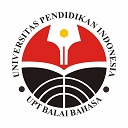Pengaruh Brain Gym Terhadap Minat Dan Hasil Belajar Dalam Pembelajaran Bahasa Jepang
Abstract
Banyak aspek yang mempengaruhi hasil belajar. Satu diantaranya adalah minat belajar. Maka, untuk meningkatkan hasil belajar bahasa Jepang, diperlukan cara yang mampu meningkatkan minat belajar siswa agar meraih hasil belajar yang optimal. Cara yang mampu meningkatkan minat belajar dan hasil belajar siswa adalah dengan melakukan kegiatan brain gym. Berdasarkan hal tersebut, penelitian yang berjudul “Pengaruh Brain Gym Terhadap Minat Dan Hasil Belajar Siswa Dalam Pembelajaran Bahasa Jepang”, bertujuan untuk mengetahui pengaruh brain gym terhadap minat dan hasil belajar dalam pembelajaran bahasa Jepang. Penelitian ini menggunakan metode eksperimen murni. Populasi yang digunakan adalah siswa kelas X Mia 8 SMA Negeri 10 Bandung Tahun ajaran 2016/2017, dan sebagai sampel penelitian ini adalah 17 orang siswa sebagai kelompok eksperimen dan 18 orang siswa sebagai kelompok kontrol. Instrumen yang digunakan adalah tes dan non-tes. Pada instrumen tes yang digunakan adalah pre-test dan post-test. Sedangkan pada instrumen non-tes yang digunakan adalah observasi dan angket. Dari hasil analisis tes diketahui nilai rata-rata bahasa Jepang sebelum diterapkan brain gym sebesar 66,62 dan setelah diterapkan brain gym nilai rata-rata menjadi 89,71 dengan nilai sebesar 4,32. dengan db = 34 pada taraf signifikan 5% = 2,04 dan 1% = 2,75. Karena lebih besar daripada , maka hipotesis kerja dalam penelitian ini diterima bahwa brain gym berpengaruh terhadap hasil belajar siswa. Dan dari hasil data angket dapat diketahui bahwa minat belajar siswa diterapkan brain gym lebih tinggi dibandingkan dengan siswa yang tidak diterapkan brain gym. Selain itu, hasil observasi menunjukkan bahwa minat belajar berpengaruh terhadap nilai belajar siswa. Semakin tinggi minat belajar semakin tinggi pula usaha yang dilakukan untuk mendapatkan hasil belajar yang optimal.
In the process of learning, a lot of aspects that affect the learning outcomes. The Interest is one of those that give an affect. To improve the learning outcomes of Japanese language is needed a way that can increase student’s interest in order to achieve optimal learning outcomes. Such way that can increase student’s interest and learning outcomes is to do the brain gym. Based on that, the author took study entitled "The Influence of Brain Gym on Student’s Interest and Student’s Learning Outcomes of Learning Japanese Subject". The aimed of this study is to know the influence of brain gym on the interest and learning outcomes in learning Japanese subject. This research used pure experiment method. The population that used is the students of class X Mia 8 at SMA Negeri 10 Bandung on the academic year 2016/2017, and as the sample of this study are 17 students as the experimental group and 18 students as a control group. The instruments that used are test and non-test. In the test instrument that used is pre-test and post-test. The non-test instruments that used are observations and questionnaires. From the test analysis result, it is known that the average value of Japanese subject before the applied of brain gym is 66.62 and after the applied of brain gym, average value become 89.71 with value is 4.32. With db = 34 at the significant level 5% = 2.04 and 1% = 2.75. Because bigger than then the working of hypothesis in this study is accepted that the brain gym influence to increase the learning outcomes. As the results from the questionnaire data, can be seen that the interest in student who applied the brain gym on the learning process is higher than the students who did not applied the brain gym. In addition, the results of observations indicate that interest is affected the learning outcomes. As high as the interest will makes the optimal outcomes.
Keywords
Full Text:
PDFRefbacks
- There are currently no refbacks.

This work is licensed under a Creative Commons Attribution-NonCommercial-ShareAlike 4.0 International License.
Published by:
Department of Japanese Language Education
Faculty of Language and Literature Education
Universitas Pendidikan Indonesia

e-ISSN: 2598-1250 p-ISSN: 2598-1234


